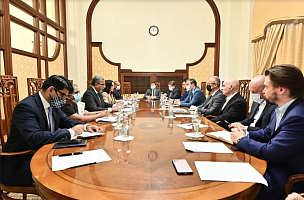The
Roscongress Foundation has published its own comprehensive study entitled ‘Latin
America's fight against the pandemic: challenges and opportunities for national
governments’. The Directorate for International and Regional Cooperation analyzed
the social, cultural, economic, and political processes in the region. One of
the key sections of the analytical review, ‘Transforming Latin America's Energy
Landscape under the Impact of the Pandemic’, was prepared together with Sergey
Brilev, President of the Global Energy Association.
The crisis caused by the COVID-19 epidemic was a major test for Latin
America: despite the delay in the spread of the disease compared to Asia and
Europe, the region was unable to make use of this temporary advantage. On 23
May, Latin America was declared the new Coronavirus epicentre and countries in
the region were equally affected by the pandemic.
The lack of integrated regional
mechanisms and strategies to address the socio-economic impact of the pandemic
is one of the key vulnerabilities in Latin America, stemming from a more
general problem: the systemic integration crisis. This trend is to some extent
offset by the multifaceted humanitarian links with extra-regional actors,
including Russia. One of the most important areas of anti-crisis cooperation
between Russia and Latin America promises to be the supply of Russian medicines
for both coronavirus treatment and vaccination.
The study ‘Latin America's fight against the
pandemic: challenges and opportunities for national governments’ focuses on the regional specifics of the
response to the pandemic and the uniqueness of social processes in the new
environment. For example, at the beginning of the crisis in countries with
strong presidential powers, the heads of state grew even more powerful.
Moreover, the emergency situation required a maximum reduction in the time for
decision-making in all areas, causing an inevitable shift in the separation of
powers towards a weakening of the legislature.
The crisis triggered by the pandemic
has affected all the energy sectors in the region that are expected to be
vulnerable to the consequences of global energy turbulence. As a result, they
are likely to fall further behind global trends: the progressive elimination of
fuel subsidies, reduction of CO2 emissions, improvement of hydrocarbon
production technologies in terms of environmental damage, and increasing the
share of renewable energy in energy production. At the same time, the study
notes the significant potential for national economies to recover from the
COVID-19 crisis, embedded in clean energy and capable of redirecting economic
incentives towards a more sustainable development model.






